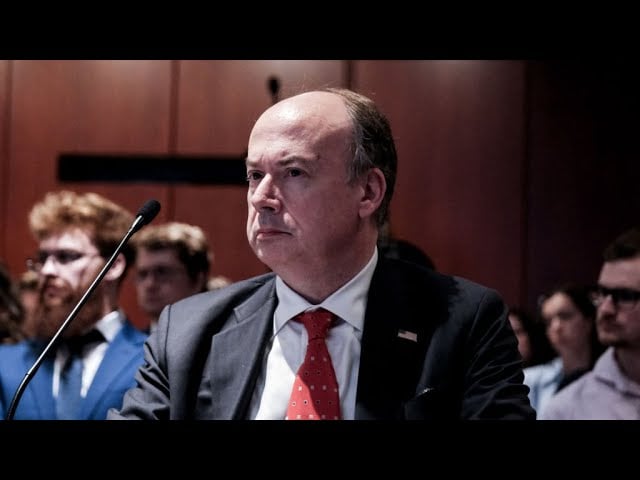“Never ask a question to which you do not already know the answer” is an age-old unwritten ‘law’ in courtroom proceedings. The reason being is it could result in unexpected harm to one’s case. This became clear during yesterday’s Washington D.C.-based disbarment hearing of former Trump DOJ official and co-RICO defendant in Fulton County, Jeffrey Clark.
During cross-examination of Garland Favorito of VoterGA.org, counsel for the Office of Disciplinary Counsel (ODC) asked Favorito:
“So, in the things that you’ve talked about today, can you list for us the ones which you believe are evidence of actual fraud having been committed?”
Favorito responded by firing off numerous findings throughout his organization’s years-long investigation:
The original ballot images in “about 70 counties” had been destroyed in spite of the laws requiring they be maintained
Analysis of Fulton County ballot images were electronically altered before the certification in 2020, which has still not been properly investigated
There were at least 8,000 double-copied ballots in Chatham County
There were 8,000 double-scanned ballots statewide (Favorito admits this may not be fraud, but rather could be errors or a mixture of fraud and errors, but that “we have no way of knowing until that is investigated)
Counsel for the ODC interrupts Favorito at that point and asks specifically for examples of fraud that is “in the public record” and “not something [he has] investigated and uncovered.”
Favorito responds that there were mail-in ballots that were not folded from being mailed nor were they printed on the correct paper stock. They were marked with toner (from a printer) rather than a writing instrument, according to senior poll-managers’ sworn affidavits being used in court cases “right now”. Favorito points out that these were known not just before January 3rd, but before December 3rd (2020).
When ODC counsel asks, “There were 100 of those ballots, correct?”
Favorito responds:
“No one knows how many ballots [there] were because we’ve spend three years in court trying to get those ballots [as] public record. We actually appealed our case to the Georgia Supreme Court. We won the case in the Georgia Supreme Court. They declared we had standing all along and the Superior Court had made a complete error. That case went back down. He then passed it off to another judge who we believed was too impartial. We filed a motion to recuse. So after three years, we have still not gotten to see the ballots that there were six sworn affidavits for that were counterfeit. That is not the appropriate way to investigate. And, the Secretary of State’s Office filed an amicus brief against us to try to prevent us from looking at the ballots.
What kind of a Secretary of State would have done that?”
This is where the proverbial mic-drop occurs. Remember, “Never ask a question to which you don’t already know the answer.” In a moment of bewilderment perhaps, to the question of “What kind of Secretary of State would have done that”, ODC counsel responds:
“A corrupt one, I guess.”
Favorito immediately fires back, “That’s your opinion, not mine.”
ODC counsel is not arguing on behalf of anyone from the State of Georgia, Fulton County, or any election entity. He is arguing strictly for the Office of Disciplinary Counsel. However, the position of his argument to disbar Jeffrey Clark should at least be somewhat congruent with the argument that there was no wide-spread fraud in the 2020 election, which, regarding Georgia, has been incorrectly proclaimed by Georgia officials since 2020.
To state “a corrupt one, I guess” in regards to the Chief Election Officer of the State of Georgia when presented not only with evidence of significant election issues that have gone widely uninvestigated since 2020, but also with obfuscation in the judicial process to allow public transparency, is a detrimental blow not only to the disbarment case, but also to the claims made by the Georgia Secretary of State regarding the 2020 election.
While the lion’s share of election claims brought regarding the 2020 election were dismissed on procedural grounds prior to an evidentiary hearing, something most Mockingbird Media outlets neglect to acknowledge, the criminal cases brought forth in places such as Fulton County, and in disbarment hearings such as John Eastman’s in California, and now Jeffrey Clark’s in D.C., have allowed evidentiary claims to be heard on the record and under oath.
Garland Favorito and VoterGA.org’s 2020 ballot inspection case was remanded back to the Superior Court 468 days ago and is still waiting to be heard.
The criminal RICO case in Fulton County is shaping up to be a blockbuster event.
This might be the greatest cross-examination failure of all time! The ODC prosecutor is challenging Garland Favorito to list examples of actual fraud and not just potential fraud. Rule #1 – don’t ask a question you don’t know the answer to. Garland starts to go through all the… pic.twitter.com/nzPZc6fkzF
— Declare Your Ballot (@DeclareUrBallot) April 2, 2024
The post Attorney *Arguing to Disbar* Trump RICO Defendant Jeffrey Clark Over Election Fraud Claims Calls Georgia Secretary of State “A Corrupt One” appeared first on The Gateway Pundit.







